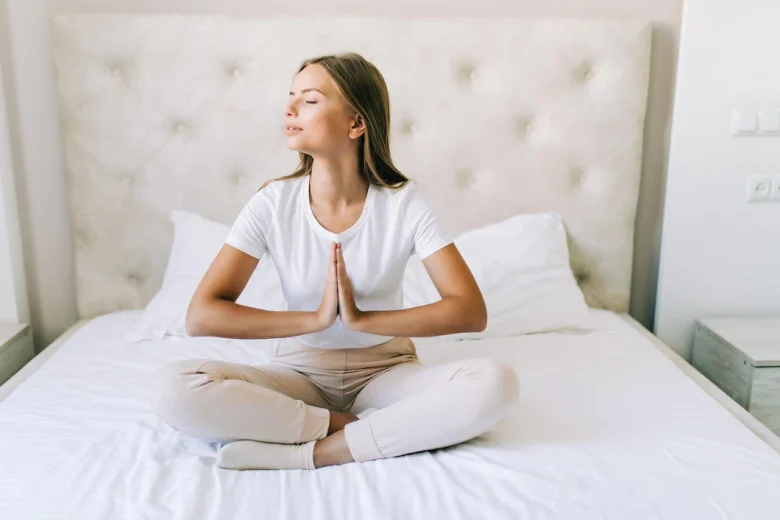Getting a good night’s sleep is one method to give yourself some much-needed rest. A good night’s sleep can help you recover from the day’s exhaustion. However, you may struggle to fall asleep sometimes, and even more so to keep up a regular sleeping schedule. If you encounter problems like this, the best approach is to create a bedtime routine.
A bedtime ritual will help your brain distinguish the day and night, alleviate day-to-day stress, and allow you to sleep more peacefully. Following the same pattern, each night before bed can eventually train your brain to recognize that it is time for you to start winding down and getting ready for sleep. After some time, you will find that you sleep better and for longer each night. Here are a few nighttime routines to try if you want to start sleeping better:
Turn Off Your Devices
Even if you’re laying in bed and tempted to check your phone, you’re more likely to have trouble sleeping if you do so. This is because the blue light generated by screens interferes with the generation of melatonin, the body’s natural sleep-inducing hormone, preventing you from falling asleep.
You should turn off all electronic gadgets in your home for at least 30 to 45 minutes before you go to bed.This may also be useful for avoiding a buddy who enjoys playing an evil operator prank call during the wee hours of the night. Make sure the red light filter is switched on if you have to glance at your phone during your nighttime ritual. It would help make time spent in front of a screen less distracting.

Read a Book
Do you remember when your parents would tell you stories before night to help you fall asleep? This method is useful even when you are an adult, albeit obviously without the benefit of having your parents read the book to you.
Reading a book might help you relax your thoughts if you’re having trouble falling asleep. It’s possible you won’t even realize that you’ve already fallen asleep on the second page of your book. You may incorporate this into your night time routine by reading books with no action-packed moments since this will make you want to keep reading to find out what happens next. Only read short-length pieces, preferably magazine articles.
It is important to remember that electronic books might harm your sleep, so you should instead choose classic books that you can physically hold in your hands. If you prefer to listen to stories, audiobooks are available.
Eat Light Meals Before Bedtime
When night time comes, one thing to remember is that you should stay away from heavy meals and alcoholic beverages for at least two to three hours before going to bed. These can result in indigestion, acid reflux, and visits to the lavatory in the middle of the night, all of which will keep you from getting a good night’s sleep.
On the other hand, going to bed hungry isn’t suggested either. It will make your stomach uneasy, making it more difficult for you to sleep. You may help fend off this appetite by snacking on something light and nutritious, such as fruits, almonds, or oats. You might also try drinking tea with chamomile to help quiet your thoughts and ease you into a restful state of mind.

Dim Room Lights
You can improve melatonin synthesis by receiving as much light as feasible during the day and keeping the lights as dark as possible at night. Melatonin is crucial for controlling your circadian cycle and sleep pattern. This circadian rhythm is your 24-hour schedule of sleep and wakefulness. When melatonin synthesis is low, the circadian rhythm is disrupted, and you’ll have difficulty falling asleep at bedtime.
A dark room lighting can simulate the sunset, signaling your brain that it’s about time for bed. A dark room will also help you become drowsy and fall asleep more quickly.
Listen to Music
Listening to music before bed can make falling asleep easier and enhance your sleep quality. Sixty-two percent of people who participated in research on sleep said that they used music as part of their evening routines to help alleviate stress.
Your particular preferences should determine the type of music you listen to. However, many individuals find classical music relaxing and tranquil, so it’s a good option if you want to unwind.
If you think music is too stimulating, consider listening to some soothing natural sounds. You may also give the option of listening to white noise a shot. This certain type of noise can obscure other, more subtle, sounds that could be present in your surroundings.

Take a Warm Bath
As the night gets closer, you will notice a natural decrease in your body temperature. It will disrupt the natural process if the temperature in the room is too high while at the same time your bodies are trying to cool down.
Consider soaking in a warm bath one hour or two hours before you plan to retire for the night. The water will cause your body to heat up and cool down fast, leaving you weary and relaxed as the water evaporates off your skin. However, remember that you should avoid hot baths as they will keep you awake due to their unbearable heat.
Meditate
You may achieve relaxation and mental stillness by meditating daily and incorporating the practice into your routine. As a result, you’ll be able to fall asleep more quickly and help you get a good night’s sleep, and many individuals use this strategy. Mindfulness meditation, for example, can assist you in controlling your thoughts and emotions, allowing you to go asleep.
If you haven’t tried meditation yet, plenty of resources are available, both online and in books, to help you get started. And if you find that this approach is not to your liking, you may choose to engage in some other type of peaceful activity, such as praying or reading devotionals.

Create a To-Do List
If you are always anxious about what the next day will bring, you might want to consider incorporating a to-do list as part of your nightly ritual. Doing so will prevent you from engaging in excessive thought at night, preventing you from falling or staying asleep. Not only will physically putting down a to-do list help you be more productive the following day, but it will also make you feel more at ease, allowing you to sleep more peacefully and soundly.
You have a wide variety of options accessible to you to add to your nighttime routine. And doing comprehensive research is the best way to know what routines suit you and your schedule. Eventually, you will notice that you wake up feeling refreshed and renewed if you are consistent with your regimen.

